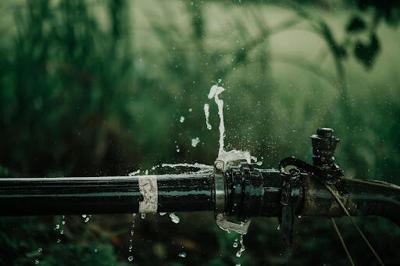
House sprung a leak? Don’t panic! Do the following instead and you’ll be home and dry before you know it!
1. Confirm You’re Not Hearing Things
Before you don your scuba gear and start bailing out water, make sure that suspicious sound is truly a leak. (Yes, sometimes that leaky faucet noise could just be the dog slurping water in the next room.) Check around faucets, under sinks, near your water heater, and wherever else a sneaky leak might lurk. Because nothing’s more awkward than calling in a water leak SOS, only to discover it was a mischievous ice maker running amok.
2. Panic is NOT the Correct Tool
Sure, a leak can signal potential doom for your floors, walls, and sense of adulthood, but running around screaming like you’re in a horror movie will only make the neighbors suspicious. Instead, take a deep breath—maybe two—and remind yourself: you got this. Remember, people wrestle with bigger problems daily, like running out of coffee, so you can handle a little (or a lot of) unexpected water.
Panic Alternative: Turn off the main water supply if it’s a major leak. Locate your shutoff valve (usually in a basement, utility closet, or somewhere equally glamorous) and twist it like your life depends on it. Because, well, your floors might depend on it.
3. Contain the Situation (a.k.a. Become a DIY Plumber for 10 Minutes)
Once the water flow is stopped (or slowed, if turning off the main valve isn’t an option), do your best impression of a quick-thinking pro. This might mean putting a bucket under a leaky faucet, stuffing a towel around a pipe, or deploying your entire collection of bath towels to soak up that miniature ocean on the floor.
A Few Household Heroes:
Buckets: your new best friend in water relocation.
Towels: invest in cheap, absorbent ones that can be your sacrificial lambs in times like these.
Baking Sheets or Trays: sometimes, you just need something flat to catch or guide water away from your floors.
4. Track Down the Source (Because Water Doesn’t Follow the Rules)
Leaks can be sneaky little gremlins. Sometimes water decides to travel from one end of a pipe to another before revealing itself in a different spot, leaving you with a maddening game of “Follow the Wet Trail.” Trace the path of moisture back to its origin if you can. Is it a busted pipe in the wall? A fatigued rubber washer inside your faucet? A cunning infiltration from the ceiling?
Warning: If it looks like the leak is coming from your ceiling, you might be dealing with roof issues, or upstairs-bathroom-issues, or possibly the Poltergeist of Plumbing. In such cases, brace yourself for a more extensive fix or a ghost-hunting expedition—whichever comes first.
5. Embrace the Toolbox (Or Figure Out Where You Last Threw It)
If you’re feeling brave and the leak appears minor—like a dripping faucet or a worn-out toilet flapper—consider taking the DIY route. YouTube tutorials abound, showing you exactly which wrench to use and where to place that plumber’s tape without turning your kitchen into a balloon animal workshop.
But—and this is a big but—if you see words like “burst,” “flood,” or “Niagara,” it’s time to call in a professional. If the pipe in question looks more complicated than your aunt’s prized crocheting patterns, don’t stress. You tried, that’s what matters. Better to be safe than transform your home into a water park.
6. Deploy the Genius Search for an Expert
When DIY fails or the problem is bigger than your knowledge base, resist the urge to Google “how to fix a tsunami in the kitchen.” Instead, type in a more direct phrase: “emergency plumber near me.” These unsung heroes are used to water misbehavior at 3 a.m., frantic phone calls, and tearful requests for help.
Once you’ve found a plumber who can respond quickly, be kind—these pros might save you from even bigger disasters down the line. Plus, it never hurts to offer them a snack or cold drink, because let’s face it, they’re probably wading through your basement or hugging your soggy pipes.
7. Insurance, Paperwork, and Other Grown-Up Tasks
Now for the part that’s about as exciting as watching paint dry: your homeowner’s (or renter’s) insurance. Depending on the cause of the leak—like faulty plumbing versus a random act of nature—your insurance might cover some or all of the costs. Take photos or videos of the damage, because if you don’t document it, did it really even happen? Then go ahead and file your claim in a timely manner. Resist the urge to procrastinate; insurance folks appreciate promptness, and you definitely want them on your side.
Here’s to a leak free home!
Related Article:


(0) comments
Welcome to the discussion.
Log In
Keep it Clean. Please avoid obscene, vulgar, lewd, racist or sexually-oriented language.
PLEASE TURN OFF YOUR CAPS LOCK.
Don't Threaten. Threats of harming another person will not be tolerated.
Be Truthful. Don't knowingly lie about anyone or anything.
Be Nice. No racism, sexism or any sort of -ism that is degrading to another person.
Be Proactive. Use the 'Report' link on each comment to let us know of abusive posts.
Share with Us. We'd love to hear eyewitness accounts, the history behind an article.